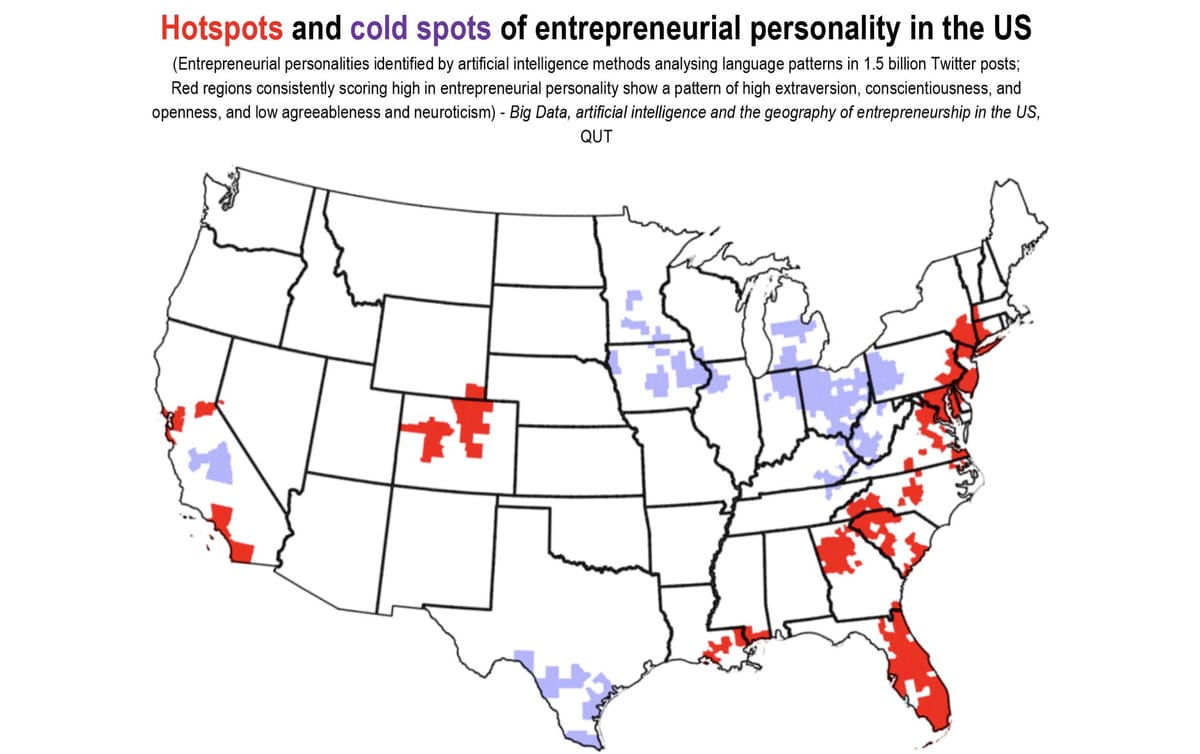Twitter as a marker of regional economic vitality

New research methods using big data and artificial intelligence present findings that connect economic vitality with ‘regional personalities’.
Associate Professor Martin Obschonka from the Queensland University of Technology and Australian Centre for Entrepreneurship Research along with researchers from the London School of Economics and Political Science (including Andrés Rodríguez-Pose), the University of Pennsylvania and the University of Mannheim have written a fascinating paper on Big Data, artificial intelligence and the geography of entrepreneurship in the United States.
Asking the question, What makes some places more entrepreneurial than others?, Obschonka and his colleagues found that places–in this case, local counties in the USA–can influence entrepreneurial behaviour.
Research shows that entrepreneurship is the result of a combination of individual and place-level characteristics.
On the one hand, individual factors such as education, experience, age, previous employment, and psychological characteristics influence the likelihood of a person becoming an entrepreneur. This understanding supports efforts to promote personal development, learning and personal traits, such as risk-taking, independence and charisma.
On the other hand, the socio-economic environment is also considered to influence the level of entrepreneurship in places. Local macro-economic conditions, industry structure, the financial environment as well as local institutions, the education system and local culture can facilitate or deter local entrepreneurship. Thus, improving these conditions can promote higher levels of entrepreneurship.
Obschonka and his colleagues show how local economies that rank higher in the ‘entrepreneurial personality profile’ (measured in terms of Conscientiousness, Openness and Extraversion) are more entrepreneurial.
For example, a local economy that ranks high in term of ‘Openness’ (as expressed in social media language) exhibits high levels of entrepreneurship. Thus, a “regional or local environment open to new ideas and change seems conducive to entrepreneurship because, by its very definition, entrepreneurship is about the discovery, development, and application of new solutions.”
This research is also interesting because of its use of big data and artificial intelligence–specifically, Twitter and Facebook. Professor Obschonka describes this as “the dawn of a new era where we do not have to wait any longer until millions of people fill out long personality questionnaires to understand the local concentration of entrepreneurially-minded people, and local mechanisms such as entrepreneurship and innovation… Instead, by means of artificial intelligence methods we can simply analyse existing, publically-available social media data such as billions of tweets to study local personality differences and their relevance for the well-being and prosperity of whole regions.”
This research helps us better understand the factors that produce entrepreneurial eco-systems. It shows a connection between ‘entrepreneurial vitality’ and ‘regional entrepreneurial personality.’
In an earlier, 2016 study, also at the county level in the USA, Obschonka and other colleagues (notably David Audretsch) examine the link between local culture and entrepreneurship. They find the propensity for entrepreneurial activity and personality to spatially cluster is linked to cultural identity and history.
Regional and local economies can develop personality traits that are more oriented towards Conscientiousness, Openness and Extraversion. Communities of entrepreneurially minded people can influence the personality of a place, making it more likely to nurture higher levels of entrepreneurship.